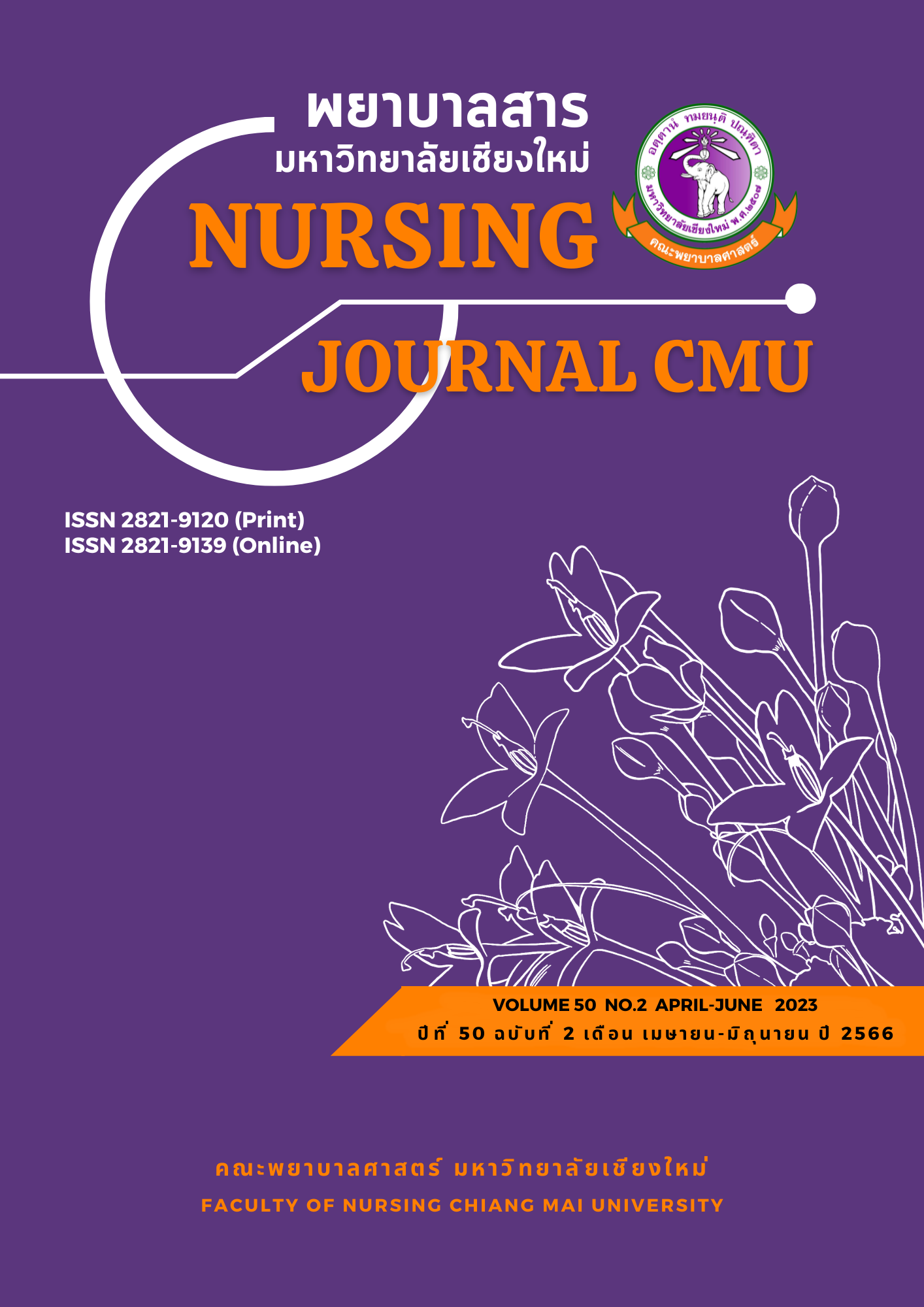Effects of a Learning Enhancement Program on COVID-19 Prevention Knowledge and Practices of Student Leaders in Anukul Wittaya School, Mae Sot District, Tak Province
Keywords:
Student leader, School, COVID-19, COVID-19 preventionsAbstract
Student leaders play a role in COVID-19 prevention in schools, and they are role models for other students. This quasi-experimental study, using a one-group pretest-posttest design, aimed to compare the average scores on knowledge and practices regarding COVID-19 prevention of student leaders in Anukul Wittaya School, Mae Sot District, Tak Province. The population consisted of 18 students who were student leaders in primary level 4 to secondary level 3. Equipment used in this research included 1) a learning enhancing program on COVID-19 prevention for student leaders, developed by applying Bloom’s taxonomy; 2) learning-enhancing videos on COVID-19 prevention for student leaders; and 3) PowerPoint media. The tools used for data collection included 1) a knowledge test on COVID-19 prevention for student leaders, with each question having an index of item-object congruence (IOC) of 0.67–1 and a reliability coefficient of 0.72, using Kuder–Richardson’s KR-20 formula; and 2) a practical questionnaire on COVID-19 prevention for student leaders, with a content validity index (CVI) of 0.84 and a reliability coefficient of 0.78. Descriptive statistics, paired t-test, and the McNemar test were applied for data analysis.
The results showed that the average score of knowledge on the prevention of COVID-19 of student leaders was statistically significantly higher than before receiving the program (p < .001), and COVID-19 prevention practices of student leaders were considerably higher than before receiving the program (p = .008).
The results demonstrate that the learning enhancement program on COVID-19 prevention for student leaders can be used to develop their potential.
References
Anderson, L. W., Krathwohl, D. R., Airasian, P. W., Cruikshank, K. A., Mayer, R. E., Pintrich, P. R., … Wittrock, M. C. (2001). A taxonomy for learning, teaching, and assessing: A revision of Bloom's Taxonomy of educational objectives. London: Longman.
Ayran, G., Köse, S., Sarıalioğlu, A., & Çelebioğlu, A. (2022). Hand hygiene and mask-wearing behaviors and the related factors during the COVID 19 pandemic: A cross-sectional study with secondary school students in Turkey. Journal of Pediatric Nursing, 62, 98-105. doi: 10.1016/j.pedn.2021.10.001
Bloom, B. S. (1956). Taxonomy of educational objectives: The classification of educational goals. London: Longman.
Bloom, B. S., Hastings, J. T., Madaus, G. F., & Baldwin, T. S. (1971). Handbook on formative and summative evaluation of student learning. New York: McGraw-Hill.
Campbell, K., Weingart, R., Ashta, J., Cronin, T., & Gazmararian, J. (2021). COVID-19 knowledge and behavior change among high school students in semi-rural Georgia. Journal of School Health, 91(7), 526-534. doi: 10.1111/josh.13029
Department of Health, Ministry of Public Health. (2020). School management manual for COVID-19 prevention in school. Nonthaburi: Author. (in Thai)
Doungsai, K., Kornoungklang, K., & Seantrong, L. (2021). Investigation of a Coronavirus outbreak 2019 in a private school, Samut Prakan Province. Journal of Health Science, 30(Suppl.3), S393-S403. (in Thai)
Hoofman, J., & Secord, E. (2021). The effect of COVID-19 on education. Pediatric Clinics, 68(5), 1071-1079. doi: 10.1016/j.pcl.2021.05.009
Lertwittayakul, T., Namkham, S., & Seedakat, S. (2022). The effects of using a program of student’s development model for students against from Covid-19 virus, upper primary school level, a school in Khon Kaen Province. Journal of Health and Nursing Research, 38(2), 150-161. (in Thai)
Manokham, T., Bunjantuek, A., Seekaenwong, N., Sriboonruang, A., & Bunlengsong, L. (2021). Learning management through online lessons on the integrated learning module: COVID –19 of Prathom Suksa VI Students at Ramkhamhaeng University Demonstration School (Elementary Level). Journal of Roi Kaensarn Academi, 7(4), 111-124. (in Thai)
Saiseesod, S. (2021). Information exposure behaviors and awareness of Udon Thani students during the COVID-19 epidemic. Valaya Alongkorn Review (Humanities and Social Science), 11(1), 13-25. (in Thai)
Souli, D., & Dilucca, M. (2020). Knowledge, attitude and practice of secondary school students toward COVID-19 epidemic in Italy: A cross sectional study. BioRxiv, 084236. doi: 10.1101/2020.05.08.084236
Srilamai, N., Wattanaviroj, N., Changpradap, W., Sudjainark, S., & Wattanakul, B. (2021). Effects of traditional games-based learning programs on social distancing to prevent the spread of coronavirus disease 2019. Journal of Health Science Research, 15(2), 25-36. (in Thai)
Tumkaew, Y., & Duangsong, R. (2018). Effects of dental health education program for behavioral modification on gingivitis prevention among Prathomsuksa VI Primary School Students, Wiangkao District, Khon Kaen Province. Thai Dental Nurse Journal, 29(1), 36-48. (in Thai)
UNICEF. (2020). Guidance for Covid-19 prevention and control in schools. Retrieved from https://www.unicef.org/thailand/reports/guidance-covid-19-prevention-and-control-schools (in Thai)
Xue, Q., Xie, X., Liu, Q., Zhou, Y., Zhu, K., Wu, H., … Song, R. (2021). Knowledge, attitudes, and practices towards COVID-19 among primary school students in Hubei Province, China. Children and Youth Services Review, 120, 105735. doi: 10.1016/j.childyouth.2020.105735
Downloads
Published
How to Cite
Issue
Section
License
Copyright (c) 2023 Nursing Journal

This work is licensed under a Creative Commons Attribution-NonCommercial-NoDerivatives 4.0 International License.
บทความที่ได้รับการตีพิมพ์เป็นลิขสิทธิ์ของวารสารพยาบาลสาร
ข้อความที่ปรากฏในบทความแต่ละเรื่องในวารสารวิชาการเล่มนี้เป็นความคิดเห็นส่วนตัวของผู้เขียนแต่ละท่านไม่เกี่ยวข้องกับมหาวิทยาลัยเชียงใหม่ และคณาจารย์ท่านอื่นๆในมหาวิทยาลัยฯ แต่อย่างใด ความรับผิดชอบองค์ประกอบทั้งหมดของบทความแต่ละเรื่องเป็นของผู้เขียนแต่ละท่าน หากมีความผิดพลาดใด ๆ ผู้เขียนแต่ละท่านจะรับผิดชอบบทความของตนเองแต่ผู้เดียว






